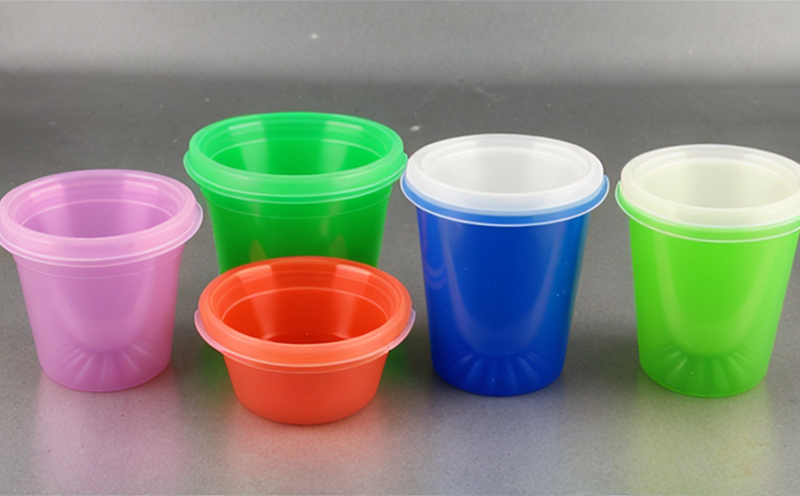EN ISO 16495 Compatibility Testing of Disposable Plastics with Goods
The testing of disposable plastics is a critical aspect within the polymer and plastics sector. Ensuring that these materials are compatible with goods they come into contact with can prevent potential hazards, such as leaching or chemical migration. The European Standard EN ISO 16495 provides comprehensive guidelines for this purpose.
Disposable plastics often find application in medical devices, hygiene products, and packaging. These applications require stringent scrutiny to ensure that the materials used do not adversely affect the performance or safety of the goods they come into contact with. This standard specifically addresses the compatibility between disposable plastic articles and other goods during their intended use.
EN ISO 16495 is widely recognized for its role in protecting consumers from potential health risks associated with incompatible materials. The testing protocol outlined in this standard is designed to mimic real-world conditions, providing a reliable assessment of compatibility. This ensures that the products meet regulatory requirements and maintain their intended functionality.
The testing process involves several stages. Initially, the plastic articles are prepared according to specified procedures. Specimens undergo immersion tests in various liquids or environments relevant to their intended use. The standard specifies precise conditions for immersion duration, temperature, and other parameters to ensure consistency across different laboratories.
After the specimens have been exposed to these conditions, they are analyzed for any changes in properties such as mass loss, leachable substances, color change, or structural integrity. These tests help determine if there is a risk of chemical migration that could affect the goods or pose health risks to users. The results provide valuable insights into the compatibility and safety of the disposable plastics under scrutiny.
Compliance with EN ISO 16495 is not only crucial for meeting regulatory requirements but also enhances brand reputation by demonstrating a commitment to quality and safety. This standard is particularly important in sectors like healthcare, where the integrity and safety of materials are paramount. By adhering to this standard, manufacturers can ensure that their products meet international standards and gain trust from consumers and regulatory bodies.
The testing process for EN ISO 16495 involves a range of sophisticated analytical techniques. These include chromatography, spectroscopy, and gravimetric analysis, among others. The choice of method depends on the specific properties being evaluated. For instance, mass loss is typically measured using precise balances, while leachable substances are analyzed via gas or liquid chromatography.
The standard also emphasizes the importance of reproducibility in testing. This ensures that results obtained by different laboratories under similar conditions are consistent. Reproducibility is achieved through standardized protocols and controlled experimental environments. Compliance with these guidelines not only facilitates inter-laboratory comparisons but also enhances the reliability of test outcomes.
Understanding the requirements and benefits of EN ISO 16495 is essential for quality managers, compliance officers, R&D engineers, and procurement teams involved in disposable plastics manufacturing or supply. By familiarizing themselves with this standard, these professionals can ensure that their products meet stringent safety and compatibility criteria.
| Aspect | Description |
|---|---|
| Specimen Preparation | Disposable plastic articles are prepared in accordance with the specified procedures to ensure accurate testing. |
| Immersion Conditions | The specimens are immersed in various liquids or environments relevant to their intended use for defined durations and at specific temperatures. |
| Analysis Methods | A range of sophisticated analytical techniques, such as chromatography, spectroscopy, and gravimetric analysis, are used to evaluate properties like mass loss, leachable substances, color change, or structural integrity. |
Scope and Methodology
- Specimen Preparation: Disposable plastic articles are prepared in accordance with the specified procedures to ensure accurate testing.
- Immersion Conditions: The specimens are immersed in various liquids or environments relevant to their intended use for defined durations and at specific temperatures.
- Analysis Methods: A range of sophisticated analytical techniques, such as chromatography, spectroscopy, and gravimetric analysis, are used to evaluate properties like mass loss, leachable substances, color change, or structural integrity.
Benefits
- Avoids Health Risks: Ensures that disposable plastics do not cause adverse health effects by migrating harmful chemicals into goods they come into contact with.
- Maintains Quality: Guarantees that the quality and performance of goods remain unaffected by the materials used in their packaging or construction.
- Enhances Reputation: Builds trust with consumers and regulatory bodies, enhancing brand reputation through compliance with international standards.
- Saves Costs: By identifying potential issues early in the development process, companies can avoid costly rework or product recalls.
Eurolab Advantages
Eurolab offers comprehensive and specialized testing services tailored to meet the unique needs of disposable plastics manufacturers. Our experienced team ensures that all tests are conducted according to international standards like EN ISO 16495, providing reliable and accurate results.
- Expertise: Eurolab's technical staff have extensive experience in polymer and plastics testing, ensuring that each test is conducted with precision and accuracy.
- Technology: We employ the latest analytical instruments to perform tests accurately and efficiently. Our state-of-the-art facilities guarantee consistent results across multiple samples.
- Compliance: Eurolab ensures that all testing procedures comply with international standards, providing peace of mind for clients seeking regulatory compliance.
- Speed: With efficient test turnaround times, our services help speed up product development cycles and time-to-market.





